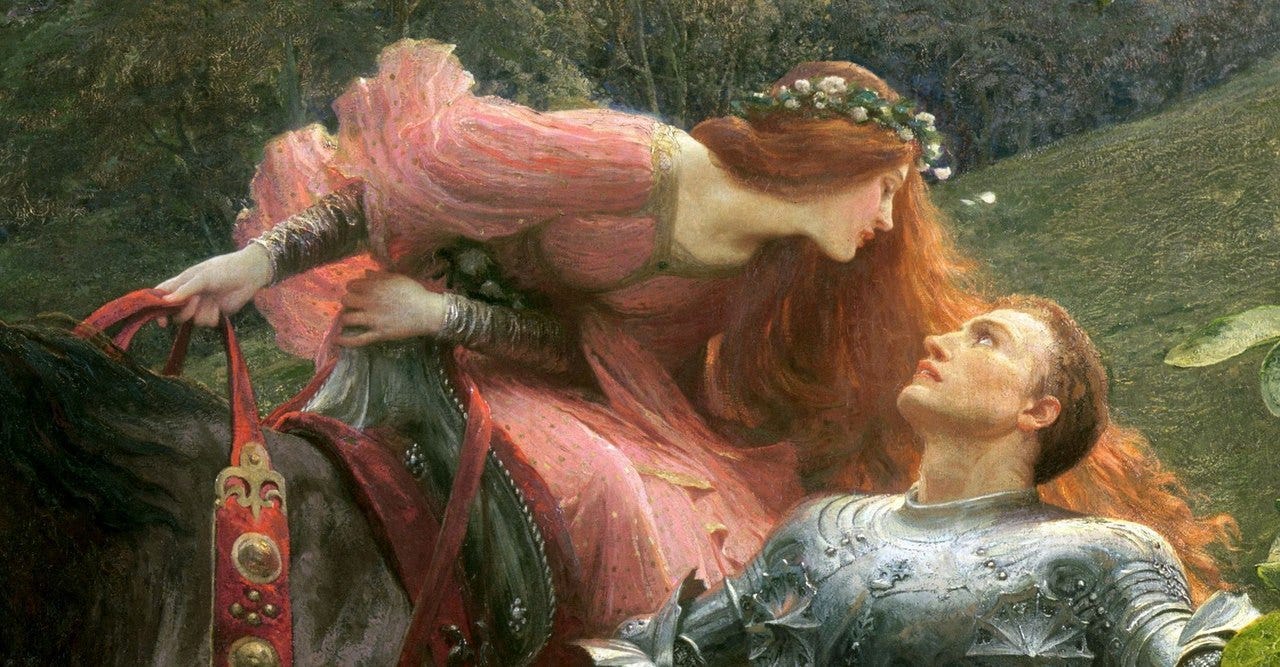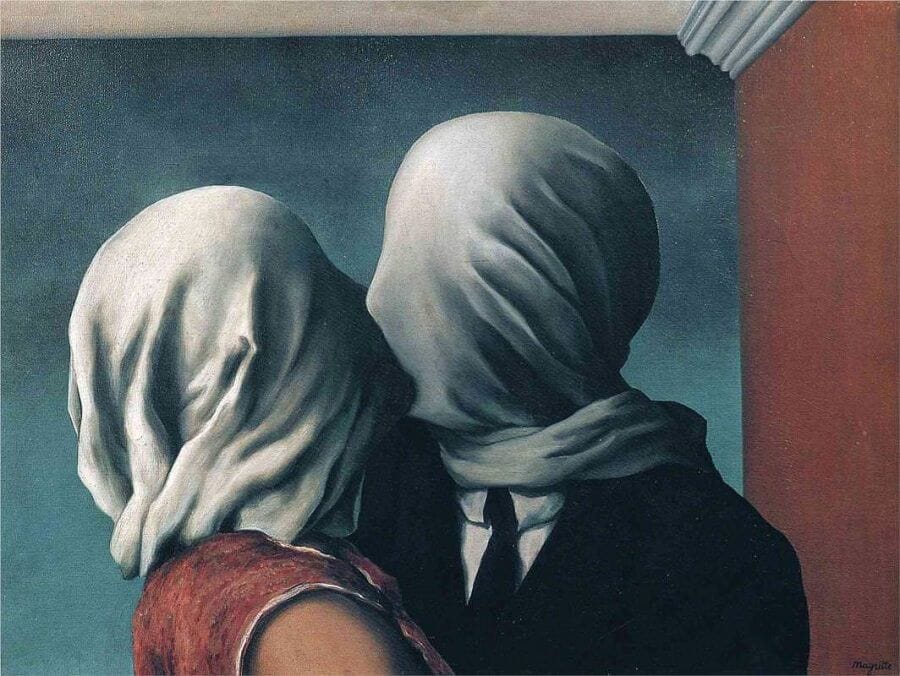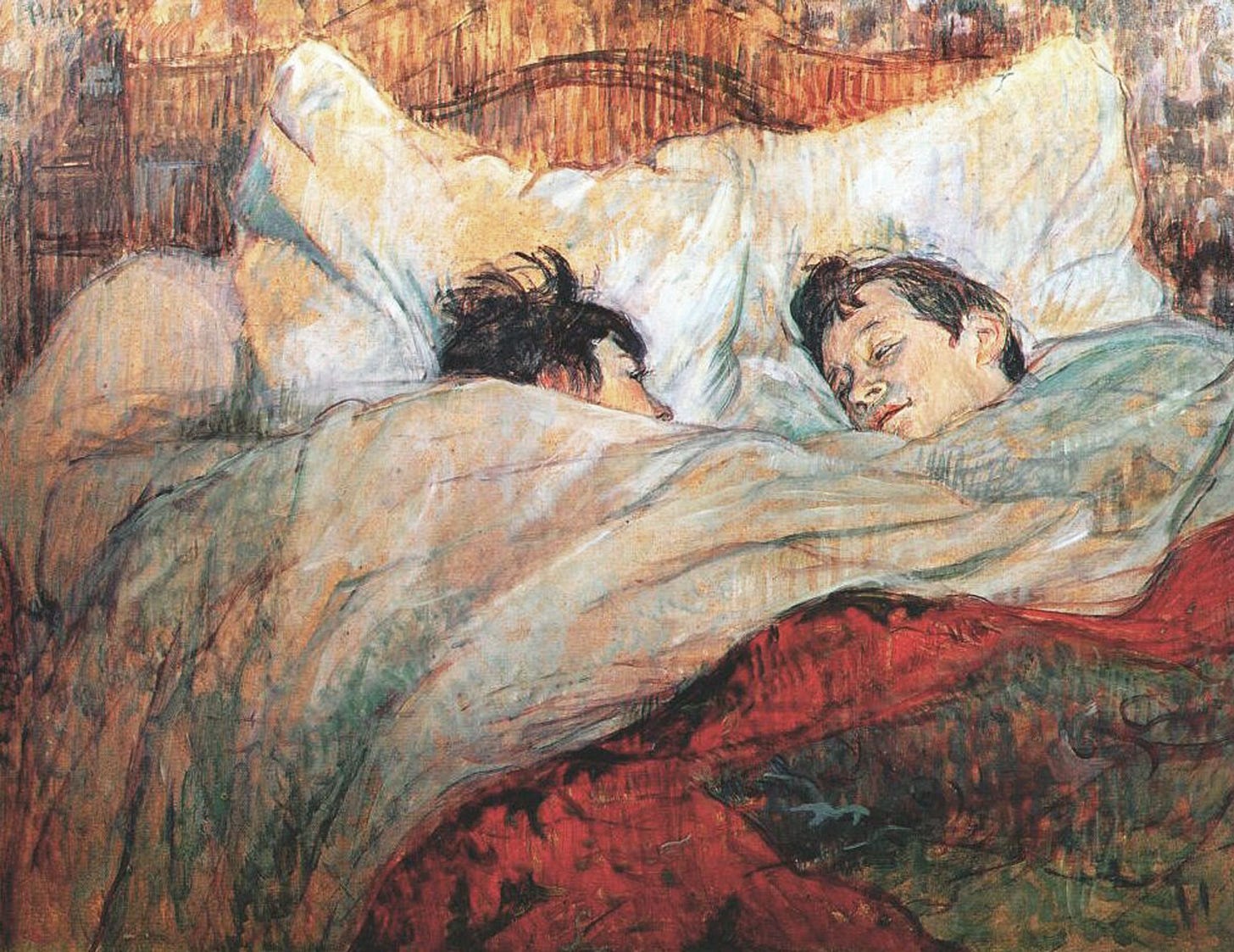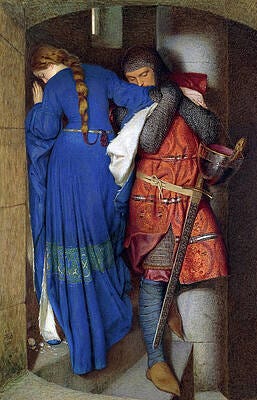i've never been in love. is my writing worse because of that? (the most important thing in the world, vol. 4)
can i still write about love even if i've never experienced it?
I’m going to be vulnerable right now, something I claim to hate doing but can’t seem to stop doing, particularly on Substack, and confess that I’m a bit of a romantic.
When I tell people this, I always want it to be accompanied by gasps of shock, as if I’ve suddenly performed some sort of magic trick and revealed that under all these perfectly-constructed layers of cool there really is a beating heart. This is never the reaction I get. In fact, I was out for drinks with a friend the other night and when I brought up what I view as my latent romantic side, she simply laughed and said, “Oh, I’ve always thought you were a romantic.” So much for layers of cool.
It’s always been this way. My friend J, who has known me since we were babies in our mothers’s respective wombs, once told me that I was the most romantic person she knows. This is incredibly embarrassing for a number of reasons, the biggest one being that I’ve never actually been in a romantic relationship. How can someone be a romantic when they’ve never experienced romance? I suppose it’s similar to the way sports fans feel, cheering for their team from the stands, knowing full well they’ll never get to set foot on the pitch. Love has always been a spectator sport for me. It’s a comforting fantasy, pretending that no one can see how badly I want it, but in truth, I probably look a lot like one of those sports fans, their entire face painted in their team’s colors. That’s how obvious my desire is. I don’t know why I find this so embarrassing, other than the fact that I’m a Scorpio, but I do. It’s embarrassing to want something and not get it. Worse than that, it’s embarrassing to want something you might never get.
This is the perspective I view love from, and yet, I write about love all the time. My novel is so much about love that my beta readers have told me to dial it back on more than one occasion, gently reminding me to make sure my characters come across as charmingly infatuated and not scary obsessed with each other. I cannot bring myself to be cynical, which would at least be respectable and literary. I hold a certain amount of envy for people, cool, young women in particular, who can write gritty, borderline-miserable stories about relationships. You would think I would fall more naturally into that camp, never having experienced any first-hand proof of love myself, but I remain unfailingly committed to the idea of a capital-L Love story. I don’t even like love triangles. They disrespect the idea of soulmates, another childish concept I find myself oddly devoted to. But more than those cool, young women and their disaffected portraits of modern relationships, I am far more envious of writers who are writing capital-L Love stories from a place of experience, as all good writers are told to do. Writers who write about love because they’ve actually been in love. This envy is writing specific (being jealous of anyone who’s ever experienced love is a fast track to being bitter and miserable.) In my day-to-day life, I don’t necessarily feel the desire for a relationship. Despite all my romantic notions, I know that real relationships involve a certain amount of compromise I am completely unwilling to engage in at this point in my life. I enjoy being selfish, at least right now. But when I turn to my writing, I worry that my lack of first-hand experience will bleed through, rendering every sentence I write as trite as a seventh-grader scribbling in their diary about their crush. I worry that never having been in love is making my writing worse.
I’m sure there are people rolling their eyes at that sentiment. Plenty of people who have no desire for love can write incredible love stories. But you’ll have to forgive me for buying into the rhetoric. This post was partially inspired by an interview clip I came across the other day, of R. F. Kuang talking about her upcoming release Katabasis. The interviewer asks her where the idea for a “love story set in Hell” came from, and Kuang responds:
“Honestly, it’s because I finally got married last summer and I’ve been thinking a lot about how special it is to have that bond with another person where you feel like you couldn’t live without them, but also how easy it can be to break trust with somebody and generally the impossibility of ever fully knowing another person. The abyss that you have to cross before you feel like you’ve even got a grasp on this unread book that is another human soul that is so radically different from yours.”
I get that. I mean, I imagine marrying someone you love deeply would prompt all of those feelings, and as a writer, you’d feel compelled to explore them in a way you haven’t before. But that’s the thing: I can imagine how it would feel. Do I actually know what that feels like, to love someone so much it feels like you couldn’t live without them? Absolutely not. I had a crush on a guy for a while back when I was a teenager that was pretty intense. I’ve really, really liked people. I’ve cried over people. I’ve certainly yearned. But marriage is so far off from any of real, lived experiences I’ve had that it might as well be a fictional construct. The complexity that Kuang speaks of, about loving someone and yet not really knowing them, is certainly a concept that writers have explored before. I don’t have to get married to know that marriage is complicated and that loving someone can be as daunting as it is rewarding. But is there something to be said for a first-hand account? If all I’m offering is an abstraction of an abstraction, how much is that really worth?
Kuang isn’t the only writer to discuss the ways in which their real-life love story contributed to their writing. Sally Rooney was quoted in an article in the Guardian last year expressing a similar sentiment, about how meeting her would-be husband at a young age shaped how she writes about love:
"Having had this experience of falling in love when I was very young, with somebody who completely transformed my life, and transforms it every day, has allowed me to write stories about people whose lives are transformed by love. Without that, I don’t think my work would be recognizable. Just his presence in my life made it possible for me to write everything that I’ve written.”
That certainly makes a better pull quote than, say, “I write about love because conceptually I’m a big fan of it.” I believe that Rooney’s life was transformed by love. I believe that makes her more adept at writing stories about love. She’s only speaking about herself here, after all, not making sweeping statements about how every writer must approach a love story. Maybe it’s sheer self-centeredness that makes me turn Rooney’s words into a mirror through which I can examine my own life, bereft of transformative love, and worry that my work is lacking as a result of this. Writers are always trying to convince their readers of something, whether it be in a world where magic is real or just in a love story between two normal people. But while there’s no one out there walking around with personal experience of being a wizard, there are plenty of people like Rooney, who write about love because it’s something they know. Who is more convincing: someone like her, or someone who has only ever viewed love from afar? Whose story would you believe?
On the more fantastical side of things, romantasy author Sarah J. Maas was quoted expressing a near-identical sentiment to Rooney, despite the vast disparity between the type of love stories they write about:
“[About her husband] He was my first boyfriend, my first anything. This sounds very cheesy to say — but I think I can write about true love because I get to live that every day.”
The wording of both Rooney and Maas’s quotes always makes me envision love as this locked room I can’t gain access to, where the secret to writing a commercially successful love story lies. Again, there are no declarative statements being made here, but you’ll forgive me for drawing certain conclusions, namely that being in love adds something fundamental to your life, something that makes writing about love possible in a way it wasn’t before. As if wanting love on a human-level wasn’t bad enough, I now feel compelled to desire it on a writing-level as well. This is unimaginably frustrating. Time, discipline and practice will make me a better writer. None of those things promise success, sure, but at least I have control over them. It’s not as if I can will love into existence for myself simply because I want it to make me a better writer. If the secret ingredient to a good love story really is experiencing love for myself, then I might be out of luck.
I’m not saying that to write about love you have to be married to the love of your life. There are just as many writers who use heartbreak as their chosen well of inspiration, whether it be unfortunate break-ups or the loss of a spouse. There are writers who instead focus on the unique agony of unrequited love, which seems as antithetical to a typical love story as you can get. But whether the love is unreciprocated or lost, whether the love fizzles or goes out with a bang, it was still there. It’s much harder to write about lost love when it was never there in the first place. Unrequited love might be easier to delve into, but a crush that isn’t returned is a fair bit different than, say, being in love with someone who is married à la Petrarch and Laura. It’s difficult, amidst all this talk of love, to not feel like a child who somehow snuck up to the adult’s table, listening to people discuss such grown-up topics as marriage and divorce, while you still exist wholly in the abstract, your head firmly in the clouds. How can I expect anyone to take me seriously? If someone hasn’t chosen to love me yet, how sure can I be that the stories I tell about love have anything important to say? That they aren’t just childish fantasies?
It would be funny if the conclusion of all of this was just me throwing my hands up and saying, “Guess I’ll wait!” and then downloading Hinge in the hopes that some man will select me, and therefore I’ll get to go forth with the publication of my novel, once love has been secured and all of my fanciful notions have been verified by some stranger. That would be insane. Not even my worst spirals about loneliness and a lack of romantic affection in my life can keep me from trying to tell this story, love and all. So what’s the point of all of this? I think it’s just to provide a different perspective from the one I see expressed so often, a romantically-infused version of “write what you know”, which says that love needs to be understood on a personal level before it can be translated to the page. This is a genuine insecurity I’ve been grappling with, and one that I honestly don’t have a solution for right now. Maybe one day I will get married and I’ll look back on all of my reflections on love up to that point and scoff. I don’t think that will happen, though. I can’t picture my future self being so dismissive.
The truth is, I have never been in love, but I feel love all the time, so intensely it threatens to bowl me over completely. This love exists in numerous forms. I know that, at some point, it could take a romantic shape, but that is by no means the only mold it fits into. How else would my friends know to term me a romantic, even with the utter lack of romantic partners in my life? I like to imagine it’s because they believe, as I do, that love cannot be created or destroyed. It merely takes different shapes. All the love I will ever feel already exists inside of me. It’s only a matter of choosing who gets to receive it. The entrance of a partner into my life would perhaps intensify that love and create new spaces for it to flow into, but it would by no means be the invention of love in my life. When I write about love, in some ways it is an abstraction of an abstraction. It’s Jane Austen and Shakespeare, it’s that moment in Champagne Coast by Blood Orange (you know the one I’m talking about) and all the fanfiction I’ve ever read. But it’s also my friends taking care of me, making me dinner and making sure I know how appreciated I am. It’s the love I have for my home, for the city I live in now, for drinking wine on summer nights, for getting off a plane and exploring a new part of the world all by myself. It’s the love I have for my mom, which didn’t vanish when she died, in the same way her love for me didn’t suddenly disappear. It’s all still there. I feel it every single day.
When I write about love, it’s not because I’m trying to communicate some fundamental truth about my own life. It’s because I’m trying to communicate a fundamental truth, period. Love exists. I will never get to experience every single iteration of it, but that doesn’t mean the love that’s inside of me isn’t real and powerful, just because a romantic partner isn’t on the receiving end of it. It doesn’t mean the stories that I write about love have less value. To delegitimize my own work like that would be a massive disservice, not only to myself, but to everyone else who is in my position, or who flat out doesn’t want a romantic partner, or who, for whatever reason, can’t have one. Love does not lend itself to gate-keepers. It’s too numerous, too vast. Maybe I sound like a complete idiot right now, a total child, but I cannot accept the fact that the only way forward as an artist is to be in love with someone. To be an artist is to be in love, full stop. I am a lover because I am an artist and an artist because I am a lover. No one can take that away from me and it certainly cannot be denied to me, simply because I happen to be alone. Whatever form love takes in my life, whether or not it be romantic, I have to believe that it only adds and that I am not starting in a place of lack. I cannot think of anything sadder than looking at my own life, my own work, and viewing it as fundamentally lacking something. If I thought that, what would be the point in creating anything in the first place? I’m certain my work will go through many transformations, some of which might coincide with relationships, others that might coincide with moves, with tragedies, with broader changes happening in the world. Regardless of what the future holds, I know that everything I need to create is already inside of me. It’s what I do with it that matters.
Even after all these conclusions, I do still want to fall in love. It has a great marketing team! Plus, I would never say no to the idea of buying a beautiful dress and having a big party mostly centered around me. That sounds awesome. I can want something and also know my life will continue to be full of joy without it. After all, I want a million-dollar book deal, but will I stop writing if I don’t get one? No, it would take a lot more than that to get me to stop. Maybe there is a version of me in some other universe who experienced a ton of romantic love and is a far better writer because of it, but that isn’t the world I’m living in. If I’m going to continue pursuing writing to the extent that I want to, I have to believe in myself fully, and that means believing in me, bereft of any romantic partners/flashy book deals/traditional markers of success. I’m not saying it’s easy, but I am saying it’s necessary. Otherwise, all that envy will eat me alive, and my book will suffer for it, and that’s something I simply can’t abide. Maybe one day someone will ask me why I wrote a love story and I will have to admit that, at the end of the day, I am just a big fan of love conceptually. When that day comes, I’ll try my best not to be embarrassed. In the meantime, I’ll continue cheering from the sidelines, continue writing my own love stories, knowing that whatever happens, I can always return to the page and keep writing. I can keep trying every single day to write stories that I think are believable, that communicate something important. And yes, I can continue being a romantic. After all this time, I’m starting to embrace the title.
If this is your first time here: Hi! My name is Oona. I’m working on finishing up my first novel, which is called TOWARDS THE SKY I OFFER IT. It’s about four students at a university in the Scottish Highlands trying to get into a mysterious academic fellowship. Other things it includes: masked balls, cryptic prophecies and sacrifices in the woods. “The Most Important Thing in the World” is my essay series where I talk about my writing/publishing journey and writing in general. If you wanna follow along, subscribe and say hi :)








Wow, I can't believe someone else has put into words everything that's been rattling around in my head lately. It's so frustrating to constantly hear to write what you know, but have a desire to write love stories even if you haven't lived them. I just always remind myself that Jane Austen wrote the first draft of Pride and Prejudice before either of the short romantic entanglements she had and is widely considered the greatest romance author of the English language, but was never married.